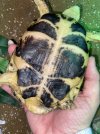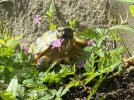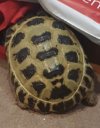Cookiesandcream1.
New Member
so I have about a 3 1/2 year old Russian tortoise. He seems healthy and was checked not too long ago by the vests and they seemed happy with him. My concern is I recently noticed this sort of dint in the middle of his belly (plastron) and I don’t think he’s always had this. He still feels solid, I am just worried he has cracked his shell or something or caused himself damage. Any advice? Thankyou



